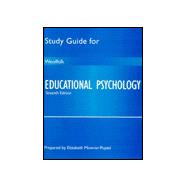| Teachers, Teaching and Educational Psychology | |
| Do Teachers Make a Difference? | |
| What Is Good Teaching? | |
| The Role of Educational Psychology | |
| Using Research to Understand and Improve Teaching | |
| How This Book Can Help You Learn | |
| Using Web Resources to Enhance Professional Development | |
| Cognitive Development and Language | |
| A Definition of Development | |
| Piaget's Theory of Cognitive Development | |
| Implications of Piaget's Theory for Teachers | |
| Vygotsky's Sociocultural Perspective | |
| Implications of Vygotsky's Theory for Teachers | |
| The Development of Language | |
| Personal, Social, and Emotional Development | |
| The Work of Erikson | |
| Understanding Ourselves and Others | |
| Moral Development | |
| Socialization: Family, Peers, and Teachers | |
| Challenges for Children | |
| Learner Differences | |
| Language and Labeling | |
| Individual Differences in Intelligence | |
| Ability Differences and Teaching | |
| Cognitive and Learning Styles | |
| Changes in the Law: Integration, Mainstreaming, and Inclusion | |
| Prevalent Problems and Mild Disabilities | |
| Students with Communication Disorders | |
| Less Prevalent Problems and More Severe Disabilities | |
| Section 504 Protections for Students | |
| Students Who Are Gifted and Talented | |
| Culture and Community | |
| Today's Multicultural Classrooms | |
| Social Class Differences | |
| Ethnic and Racial Differences | |
| Girls and Boys: Differences in the Classroom | |
| Language Differences in the Classroom | |
| Creating Culturally Compatible Classrooms | |
| Bringing it All Together: Teaching Every Student | |
| Behavioral Views of Learning | |
| Understanding Learning | |
| Early Explanations of Learning: Contiguity and Classical Conditioning | |
| Operant Conditioning: Trying New Responses | |
| Applied Behavior Analysis | |
| Behavioral Approaches to Teaching and Management | |
| Recent Approaches: Self-Regulation and Cognitive Behavior Modification | |
| Problems and Issues | |
| Cognitive Views of Learning | |
| Elements of the Cognitive Perspective | |
| The Information Processing Model of Memory | |
| Long-Term Memory: The Goal of Training | |
| Metacognition, Regulation, and Individual Differences | |
| Becoming Knowledgeable: Some Basic Principles | |
| Complex Cognitive Processes | |
| Learning and Teaching About Concepts | |
| Problem Solving | |
| Teaching Concepts in Diverse Classrooms | |
| Problem Solving | |
| Becoming an Expert Student: Learning Strategies and Study Skills | |
| Teaching for Transfer | |
| Social Cognitive and Constructivist Views of Learning | |
| Social Processes in Learning | |
| Social Learning and Social Cognitive Theories | |
| Constructivism and Situated Learning | |
| Applications of Constructivist and Situated Perspectives on Learning | |
| Looking Back at Learning | |
| Motivation in Learning and Teaching | |
| What Is Motivation? | |
| Four General Approaches to Motivation | |
| Goal Orientation and Motivation | |
| Goals: Lessons for Teachers | |
| Interests and Emotions | |
| Self-Schemas | |
| Motivation to Learn in School | |
| On TARGETT for Learning | |
| Bringing it All Together: Strategies to Encourage Motivation and Thoughtful Learning | |
| Creating Learning Environments | |
| The Need for Organization | |
| Creating a Positive Learning Environment | |
| Maintaining a Good Environment for Learning | |
| The Need for Communication | |
| Summing it up: Learning Environments for All Students | |
| Teaching for Academic Learning | |
| The First Step: Planning | |
| Teacher-Directed Instruction | |
| Teacher Expectations | |
| Student-Centered Teaching: Examples in Reading, Mathematics, and Science | |
| Effective Teaching in Inclusive Classrooms | |
| Teaching for Self-Regulation, Creativity, and Tolerance | |
| Self-Regulation and Agency | |
| Creativity | |
| Social and Emotional Learning | |
| Compassion and Tolerance | |
| Creating a Learning Community | |
| Standardized Testing | |
| Evaluation, Measurement, and Assessment | |
| What Do Test Scores Mean? | |
| Types of Standardized Tests | |
| Issues in Standardized Testing | |
| New Directions in Standardized Testing | |
| Classroom Assessment and Grading | |
| Formative and Summative Assessment | |
| Getting the Most from Traditional Assessment Approaches | |
| Innovations in Assessment | |
| Effects of Grades and Grading on Students | |
| Grading and Reporting: Nuts and Bolts | |
| Beyond Grading: Communication | |
| Appendix: Preparing for Licensure: PRAXIS II | |
| Glossary | |
| References | |
| Name Index | |
| Subject Index | |
| Table of Contents provided by Publisher. All Rights Reserved. |








